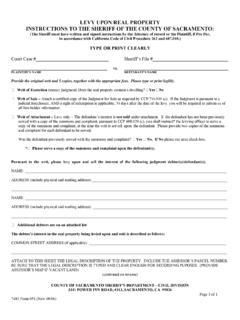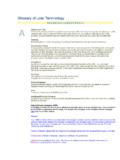Transcription of North Dakota Judgment Collection and Execution …
1 North Dakota Judgment Collection and ExecutionAuthor: Douglas R. Hookland, partner in Scott Hookland LLP. 1-800-334-8986 or (503) 620-4540. Mr. Hookland is licensed to practice in the state and federal courts of North : June 6, : The below summary is and should be construed as general information only. North Dakota statutes are subject to constant change by the legislature and interpretation by courts. As such, this summary can become quickly outdated. This information should not be used or construed as legal advice, and we recommend you consult with a North Dakota licensed attorney competent in the area of creditor s rights or collections for any specific question or CR 3 permits serving summons and complaint before filing with the court.
2 Serve first, without a case number, and then file with court (and get case number assigned). Upon filing, the court issues notice of filing and assignment (which gives a case number), which can be served by mail on the defendants (since they were previously personally served with summons and complaint). of Attorney Fee Clauses: attorney fee clauses in documents that evidence a debt, such as promissory notes, trust deeds, and security agreements, are not enforceable. NDCC , I believe attorney fee clauses in construction contracts and material and rental equipment supplier credit applications and personal guaranties are not documents evidencing adebt . Supplier credit applications and guaranties are sales agreements, where debt does not exist at the time of Execution , and will only exist if and when the customer purchases or rents something on their account.
3 Likewise, a construction contract is not a loan or evidence of an existing debt, but rather has obligations by both parties that do not involve a pre-existing debt orpayment thereof. I have successfully argued attorney fee clauses in a credit application and related guaranty are At the time of getting a money Judgment , or immediately after entry, file with court an affidavit of identification of individual debtor pursuant to NDCC 28-20-15. This permits the court clerk to docket or enter the To Establish Judgment Lien. Under NDCC 28-20-12, the court clerk shall file the Judgment roll immediately after entering the Judgment . Under NDCC 28-20-13, the court clerk then dockets the Judgment in a separate record called Judgment docket . The Judgment becomes a lien on real property, except the homestead, from the date of docketing, and is a lien for ten (10) years from the date of docketing.
4 If the Judgment debtor has property in another county(ies), under NDCC 28-20-13 file with the court clerk of such county(ies) a transcript of the original Judgment docket. The Judgment becomes a lien on real property in such other county(ies) from the time of filing of such are valid and can be executed upon for a period of ten (10) years after their entry. NDCC 28-20-01. judgments can be renewed for an additional ten (10) year period if, within the 90 days preceding the expiration of ten (10) years from the first docketing of such Judgment , the Judgment creditor or its attorney files with the court where the Judgment was first docketed an affidavit complying with NDCC 28-20-21. See NDCC 28-20-21, 28-20-22, and 28-20-23. The court clerk will file a copy of the renewal affidavit in each county where the Judgment was transcribed.
5 NDCC 28-20-22. The entry and docketing of the renewal affidavit continues the Judgment lien in the county(ies) where it is docketed for ten (10) years from the time of the docketing of such affidavit. NDCC 28-20-23. The renewed Judgment can be enforced during the second ten (10) year period the same as during the initial ten (10) year period. NDCC Cancellation of Judgment Record. After ten (10) years after the entry of a Judgment that is not renewed, or after twenty (20) years after entry of a Judgment that has been renewed, the Judgment must be canceled of record. NDCC 28-20-35. Therefore, judgments are enforceable for a maximum of ten (10) years or, if timely renewed, twenty (20) Payments on judgments . A partial payment on a Judgment debt must be first applied to post Judgment costs , then to accrued interest, then to the principal balance.
6 NDCC 28-20-36. Post Judgment costs is not defined in this statute, so I think it makes sense to include any costs and disbursements and attorney fees in the Judgment as part of post Judgment costs . of judgments . NDCC Chapter 28-21 deals with enforcing judgments by Execution . Must wait 14 days after entry of Judgment before taking any type of Execution or Collection action. ND Rules of Civil Procedure 62 and 69. When the 14 day period runs, pay the court $ and request a writ of Execution ( Execution of Judgment ) from Traci Holt at the Williams County District Court (701-774-7914) and send it to Sergeant Ben White of the Williams County Sheriff s office (701-577-7700) and he will promptly levy on all banks and credit unions in Williams County and will look for personal property of the debtors to execute on (I think including monies owed to the debtor by third parties).
7 The writ of Execution must be returned in 60 days by the Sheriff. The only time a garnishment (as opposed to Execution and levy by the sheriff) is required is to reach an employee s wages, and in that case our firm issues and serves the garnishment documents pursuant to NDCC Chapter A continuing wage garnishmentlasts 270 days. See further discussion below about Debtor Examinations. NDCC Chapter 28-25 deals with Judgment debtor exams. The Judgment debtor may be required to appear and answer concerning his property (a) if an Execution has been returned unsatisfied in whole or in part by the sheriff of the county where the Judgment debtor resides or has a place of business, or by the sheriff of the county where issued, if the Judgment debtor is a nonresident, or (b) if before the return of the Execution it is made to appear to the court that the Judgment debtor has property which the Judgment debtor unjustly refuses to apply to the satisfaction of the Execution .
8 NDCC 28-25-01. The examination must be held in the county where the Judgment debtor resides (if a resident of the state); otherwise it may be held where ordered by the court. NDCC 28-25-02. The parties may require witnesses to appear and testify and such witnesses (and the Judgment debtor) can be required to produce documents. NDCC 28-25-09, 28-25-04, and ND Civ. R 69. So use requests for production or subpoenas for Judgment debtors and subpoenas for third party witnesses. Bring in third parties having knowledge of the Judgment debtor s assets to the Judgment debtor exam by way of ND Civ. R 45 (subpoena). If any person, party, or witness disobeys an order of the judge or referee duly served, they may be punished for contempt. NDCC 28-25-16.
9 If the personcommitted is unable to perform the act required, they may be discharged from imprisonment. NDCC 28-25-16. A creditor can proceed by garnishment against any person or entity indebted to orhaving any property in possession or under control belonging to the debtor. This procedure is set forth in NDCC Chapter Garnishment appears to be limited to reaching the earnings of the debtor while those earnings are held by a third-party employer. To garnish a bank or any person or entity not an employer, you have the sheriff execute and levy as described above in section 8.






